Boy Who Stole His Teacher’s Pet Fish Because She Abuses Them Turns To Reddit For Advice
When you think about pets, the first sets of animals that come to mind are dogs and cats. But then there are different animals that people use as pets, and fish is one of them.
There are pet parents who love their little furry ones so much that they care for them to the fullest. On the other hand, there are pet parents who are so clumsy and who don’t give a damn about their pets.
The teacher in Dr. Terri Orbuch's research highlights the importance of nurturing relationships, and neglecting pets can reflect a lack of care that extends beyond animals. "When individuals fail to nurture their responsibilities, it can lead to negative outcomes for both the caretaker and the dependent," she notes. I’ll save you all the suspense and get right into the story, which was posted to the AITA subreddit community by a student who is also a Redditor.
The OP gave a brief introduction by saying that the family owns a small fishing company. And here it is...
"My uncle does charter fishing while my dad and grandparents do commercial fishing, and my mom is a marine biologist. We also have fish tanks at home, so I grew up around this and I know a lot about fish," says the OP.
But then the OP’s teacher had a nasty aquarium with fish that she hardly took care of. Many times, the OP offered to help the teacher care for the fish, but she refused.
So the OP decided to take things personally and "save the fishes". Want to know how?
Find out by reading the full story below.
I stole my teacher's pet because she abuses them

With the headline out of the way, here is the story in full

A nasty a** aquarium

The situation of a student feeling compelled to intervene in the welfare of a pet fish speaks volumes about empathy and moral development. According to developmental psychologist Jean Piaget, children progress through stages of moral reasoning, moving from a focus on obedience to authority to a more principled understanding of justice and care. This scenario illustrates a form of moral reasoning where the child identifies a perceived injustice (the teacher's treatment of the fish) and feels a responsibility to act, even if that action is misguided. Research published in the Journal of Moral Education indicates that children who develop strong empathetic responses are more likely to engage in altruistic behaviors, suggesting that this boy’s actions stem from a place of caring rather than malice.
In cases like this, fostering a child's ability to express their feelings about animals and their treatment can lead to healthier coping strategies. Encouraging discussions around empathy and ethical treatment of pets can help guide children to express their concerns more appropriately and constructively.
Fish shouldn't live in the same temperature range

I pointed the issues out

My cousin took the fish and put them in bags

The Role of Empathy in Child Development
Empathy is a crucial component of social development in children. According to research by Dr. Nancy Eisenberg at Arizona State University, the ability to empathize grows with age and is influenced by both parental modeling and social environments. Children who witness empathetic behavior from adults are more likely to replicate those behaviors in their own interactions. This aligns with Vygotsky's social constructivist theory, which emphasizes the role of social interaction in learning. Therefore, a child's reaction to the perceived mistreatment of a pet fish can be seen not only as an instinctive response but also as a reflection of the values taught in their environment.
To nurture empathy, parents and educators can create opportunities for children to engage in caring for animals, which can foster a sense of responsibility and compassion. Programs that involve caring for pets in schools or community settings can also enhance emotional intelligence and empathy in children.
The school launched an investigation

My parents are okay with it

The Reddit thread got upvoted 3.2K times with some Redditors supporting the OP saying that his actions were morally right. But at the same, there were other Redditors who still maintained that the OP did was wrong.
Among the over 400 comments that the post has, we’ve gathered the most upvoted ones so you can check them all out below.
1. Full Ocean's 11 aquatic liberation action
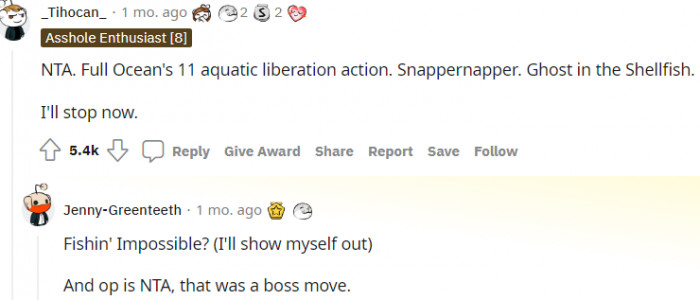
The impulse to 'rescue' the fish from a perceived abuser can also be viewed through the lens of psychological reactance theory. According to social psychologists like Dr. Jack Brehm, when individuals perceive their freedoms being threatened—such as an animal's right to humane treatment—they may react by taking drastic measures to restore that freedom. This boy's actions could represent a form of psychological rebellion against what he sees as an injustice. Theories of reactance suggest that individuals may engage in behaviors that are counterproductive or socially unacceptable when they feel their autonomy or moral beliefs are being challenged.
Addressing these feelings in constructive ways may involve discussing the importance of appropriate channels for expressing concerns about animal welfare, such as reporting to a trusted adult or advocating for change through dialogue rather than theft.
2. Sending the teacher post cards from the fish
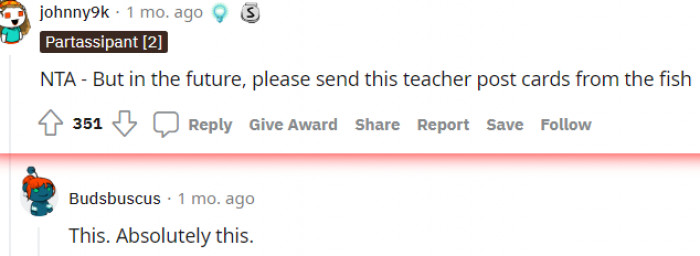
3. Be careful about situations like this
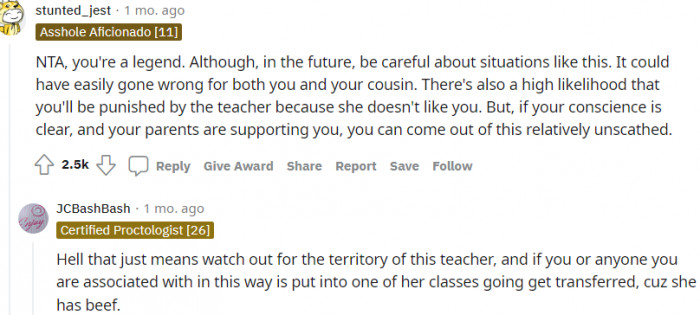
4. My heart is glad because of this
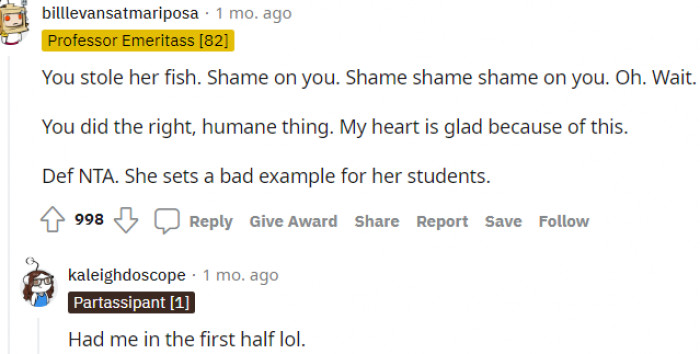
Understanding Behavioral Impulses
Research into adolescent behavior underscores that young people often act on impulse, particularly when they perceive a moral wrong. A study by Dr. Laurence Steinberg at Temple University found that adolescents tend to engage in riskier behaviors due to underdeveloped decision-making processes, including an inability to fully assess the consequences of their actions. This is particularly relevant in situations where emotions run high, such as witnessing perceived animal abuse. Understanding this is crucial when evaluating the boy's decision to steal the fish, as it illustrates how emotional responses can override rational thought in youth.
To mitigate impulsive reactions, it is essential for caregivers and educators to promote emotional regulation strategies, such as mindfulness or problem-solving skills, which can help children think before they act in emotionally charged situations.
5. A special type of gold fish
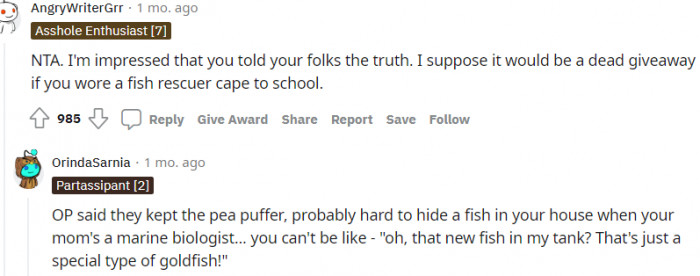
6. Moral actions are directly conflicting what's legal
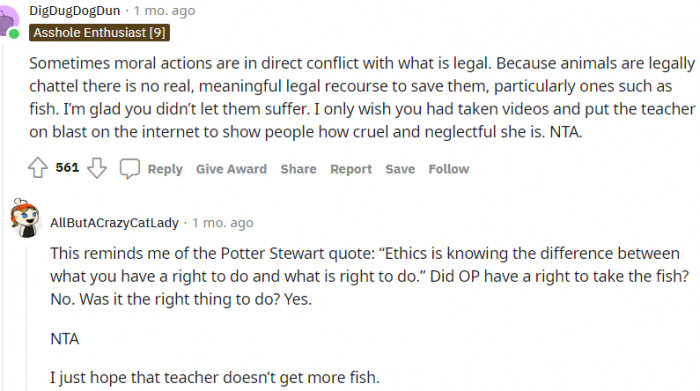
7. It's worthwhile to cover ones bases
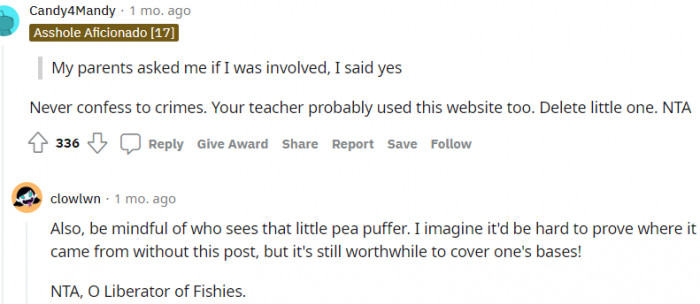
The underlying motivations for the boy's actions also touch on self-esteem and envy, particularly regarding his feelings about the teacher's pet fish. Research in social comparison theory, particularly by Dr. Leon Festinger, suggests that individuals often compare themselves with others to evaluate their own worth. This boy's jealousy over the teacher's pet may have contributed to an impulsive decision to take the fish, believing that doing so would rectify his feelings of inadequacy. Such comparisons can lead to negative emotional states, including envy and resentment, which can cloud judgment and prompt reckless behavior.
Addressing feelings of inadequacy and jealousy can be approached through discussions about self-worth and personal value. Encouraging children to focus on their unique strengths and qualities can help mitigate the need for comparison and promote healthier self-esteem.
8. Saving the fishes from an untimely death

9. It's a large scale operation
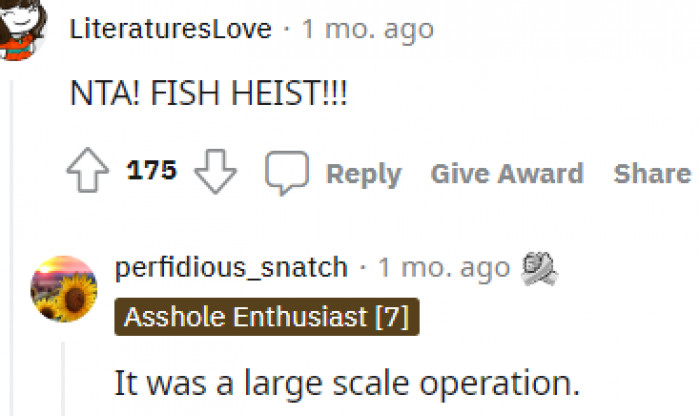
10. Fishes are not easy
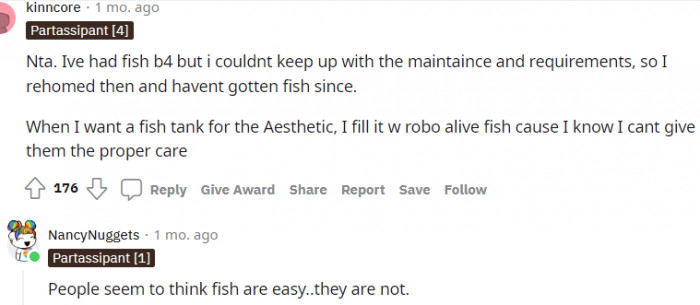
Constructive Conflict Resolution
Conflict resolution skills are essential for managing interpersonal relationships effectively. According to Dr. John Gottman, a renowned psychologist known for his work on relationships, teaching children how to navigate conflicts positively can prevent misunderstandings and promote healthier interactions. In this case, the boy's method of addressing the teacher's treatment of the fish was not only misguided but also counterproductive in solving the issue at hand. By fostering skills such as negotiation, communication, and empathy, children can learn to express their concerns without resorting to actions that could lead to further conflict.
Implementing role-playing scenarios in classrooms can provide children with the tools they need to articulate their feelings and seek resolution constructively. Such exercises can build confidence and equip them with essential life skills that are beneficial beyond the classroom.
11. When you are moray eel-y in the right
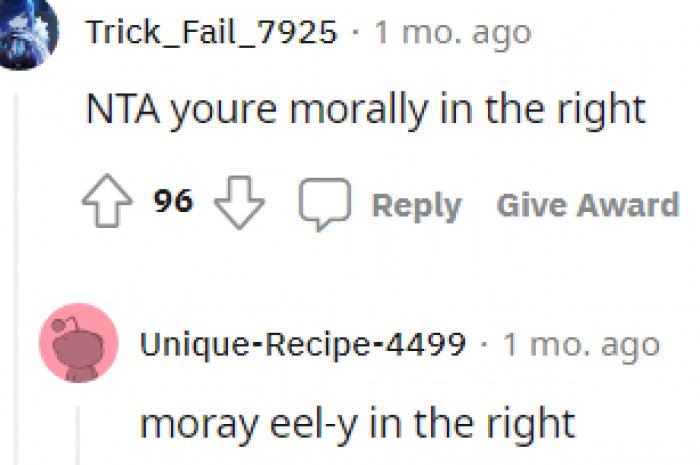
12. Too many specifications and the post should be deleted
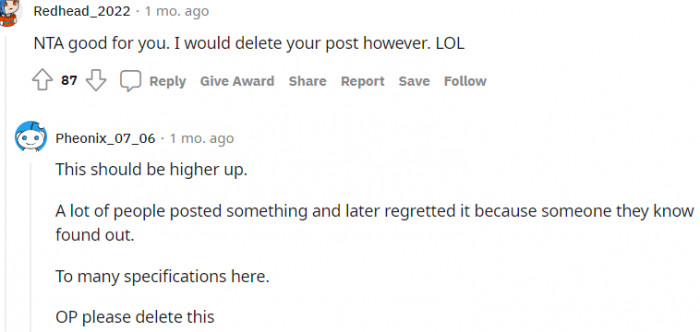
13. Congrats on pulling it off

The act of stealing a pet fish, while seemingly trivial, raises significant questions about attachment and the human-animal bond. Research in animal behavior and psychology indicates that children often form strong attachments to pets, which can be sources of comfort, companionship, and emotional support. Dr. John Archer, a psychologist specializing in human-animal interactions, posits that these bonds can influence a child’s emotional development and coping mechanisms. In this situation, the boy's attachment to the idea of having a fish like the teacher's might have prompted his misguided actions in an attempt to fulfill a perceived emotional need.
Encouraging children to cultivate healthy attachments with pets can be beneficial. Parents and educators should promote understanding of the responsibilities associated with pet ownership and the importance of respecting animals as living beings that require care and kindness.
14. Stealing in this instance is wrong
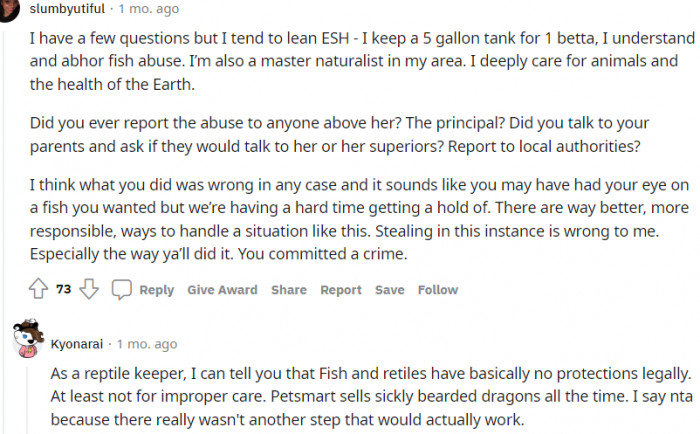
15. Could have been a cool story but...
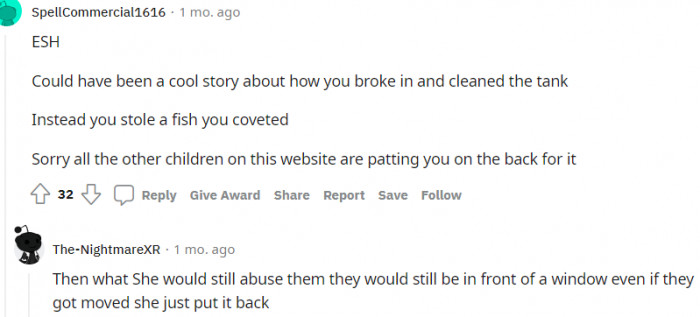
16. Theft and lying are still wrong
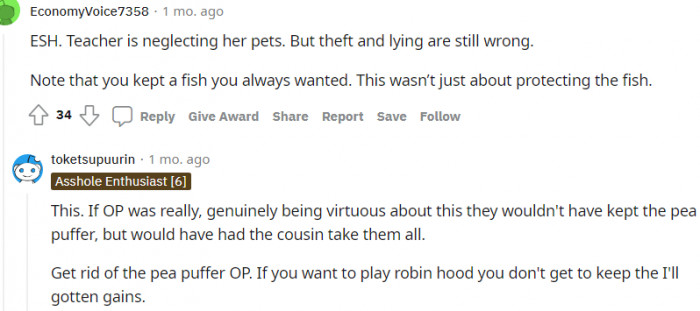
Advocating for Animal Welfare
Advocacy for animal welfare is an important aspect of developing ethical reasoning in children. Studies show that children who engage in animal welfare activities, such as volunteering at shelters or participating in educational programs about humane treatment, exhibit greater empathy and responsibility. A study published in the Journal of Applied Animal Welfare Science found that children involved in such programs are not only more likely to advocate for animals but also develop a general sense of social responsibility. This reflects the broader connections between caring for animals and developing altruistic behaviors.
To support this development, schools can introduce programs that emphasize animal care and welfare education, teaching children about compassion and the impact of their actions on living beings. This proactive approach could help channel their concern for animals into positive advocacy rather than misguided actions.
17. The entertaining rescue mission

18. What if she decides to buy new fishes?

19. She should have accepted the help

Lastly, the boy's actions can serve as a pivotal learning experience regarding personal accountability. According to psychologist Dr. Carol Dweck, a growth mindset can encourage individuals to view challenges and mistakes as opportunities for learning rather than failures. By encouraging the boy to reflect on his actions and consider the consequences, he can cultivate a sense of responsibility and learn valuable lessons about ethical decision-making. Personal accountability is a crucial skill that fosters maturity and self-awareness, which are essential for navigating complex social situations.
Encouraging open discussions about choices and their impacts—not just on oneself but on others—can facilitate this growth. Parents and educators can guide children through reflective exercises that help them understand the broader implications of their actions and the importance of making informed, ethical decisions.
20. You should delete if this truly happened

There’s nothing wrong with trying to help, especially when you know that the way things are done is wrong. But then when you do a good thing in the wrong way, does that make it right?
Well, the Redditors have given their own takes on this story, so it’s now over to you to drop yours as well by using the comments section. Do share it with your loved ones to get their opinions too.
Psychological Analysis
This situation reveals a fascinating interplay between empathy and impulsivity in child development. The boy's decision to "rescue" the fish likely stems from a strong sense of moral responsibility and emotional attachment, reflecting his values and upbringing. However, his impulsive action also underscores a common challenge in youth—acting on feelings without fully considering the consequences, which highlights the importance of teaching constructive ways to address perceived injustices.
Analysis generated by AI
Practical Steps for Healing
In conclusion, the incident involving the boy's theft of his teacher's pet fish highlights numerous psychological principles, from moral development and empathy to impulsivity and personal accountability. Research consistently shows that fostering empathy, discussing ethical treatment of animals, and promoting constructive conflict resolution strategies can significantly enhance children's emotional and social skills. Furthermore, encouraging responsible pet ownership and advocacy for animal welfare can empower children to act on their values in constructive ways. Ultimately, integrating these principles into educational environments can help shape compassionate, responsible individuals who understand the impact of their actions on both people and animals.



